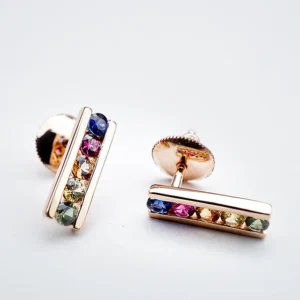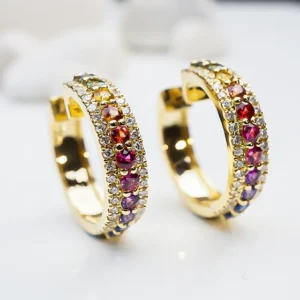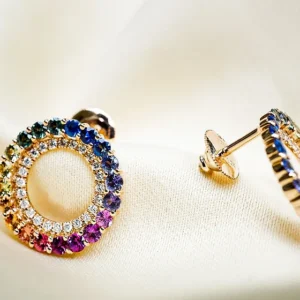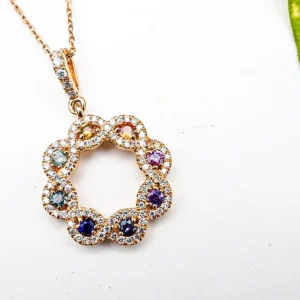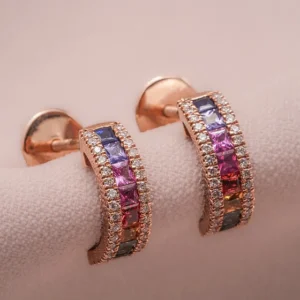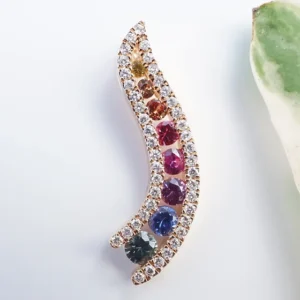The Definitive Guide to Discovering Your Ideal Ring Size
Selecting the right ring size is a crucial step when purchasing a ring, whether it’s for an engagement, wedding, or a special gift. A poorly fitting ring can be uncomfortable and may even risk slipping off or getting stuck on your finger.
Table of Contents
To avoid such complications, this comprehensive guide will walk you through the intricacies of ring sizing, offering expert advice, tips, and insights to ensure you find the perfect fit. From understanding ring sizing basics to practical measuring methods, we’ve got you covered.
Understanding Ring Size
Ring Size Basics
Ring size refers to the measurement that determines how snugly or loosely a ring fits on your finger. It’s usually expressed as a number, which corresponds to a specific circumference or diameter. Standard ring sizes can vary from country to country, so understanding the sizing system in your region is essential.
The Importance of Accurate Sizing
Finding the right ring size is crucial not only for comfort but also for safety. A ring that is too tight can lead to discomfort and may be challenging to remove, while a ring that is too loose may easily fall off or get lost. Moreover, accurately sized rings simply look better and feel more comfortable.
Factors Affecting Ring Size
Several factors can affect your ring size, including:
- Time of day: Fingers can swell slightly as the day progresses, so it’s advisable to measure your finger in the afternoon or evening.
- Temperature: Cold weather can cause your fingers to shrink, while hot weather can make them swell. Consider this when sizing your ring.
- Pregnancy: Pregnancy can lead to fluid retention, which may temporarily affect your ring size.
- Weight fluctuations: Significant weight gain or loss can alter your ring size.
- Medical conditions: Conditions like arthritis can affect finger size, so consult with your healthcare provider if necessary.
How to Measure Ring Size
The DIY Approach
1. Gather Your Materials
Before embarking on the journey of accurately measuring your ring size, it’s imperative to gather the essential tools that will ensure precision. To achieve the most accurate results, you’ll need three key items: a flexible measuring tape or a simple piece of string, a pen, and a reliable ruler.
The measuring tape or string will wrap gently around your finger, capturing its circumference, while the pen will enable you to mark the point where the ends of the tape or string meet.
This mark is a critical reference point for determining your ring size. Finally, the ruler, marked with clear millimeter measurements, serves as the tool that translates the length of the tape or string into your precise ring size.
With these seemingly basic yet indispensable items at your disposal, you’ll be well-prepared to embark on the journey of finding your perfect ring size with confidence and accuracy.
2. Measure Your Finger
When you’re ready to measure your ring size, it’s crucial to follow a simple yet precise process. Begin by gently wrapping the measuring tape or string around the base of the finger you intend to wear the ring on.
Ensure that it rests snugly against your skin but isn’t pulled too tight, as this might lead to an inaccurate measurement. Once the tape or string is in place, take a moment to mark the point where it meets using the pen.
This marked spot will serve as a reference for the measurement. Now comes the moment of truth: take your trusty ruler, clearly marked with millimeter measurements, and place it alongside the marked section of the tape or string. Carefully read the measurement in millimeters, and voila!
You have determined your precise ring size. This straightforward yet meticulous process is the key to ensuring that your rings fit comfortably and securely, enhancing both your style and peace of mind.
The DIY Approach: 5 Steps
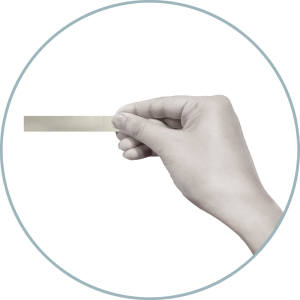
Step 1
Cut a strip of tape/paper strip/string.
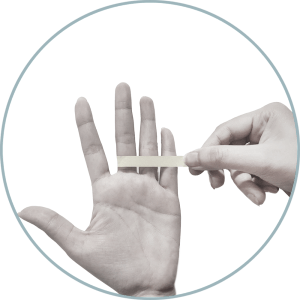
Step 2
Wrap the tape/paper strip/string around the finger you intend to wear the ring on.
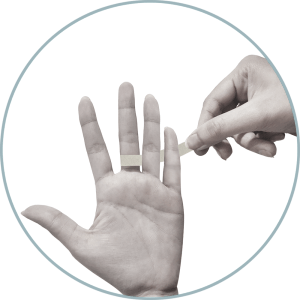
Step 3
Hold the tape/paper/string in a way that it tightly wraps around your finger.
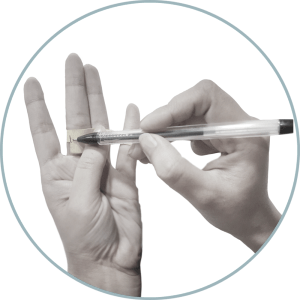
Step 4
When the piece of string or tape becomes a complete circle around your finger, make a mark at the point on the tape/string.
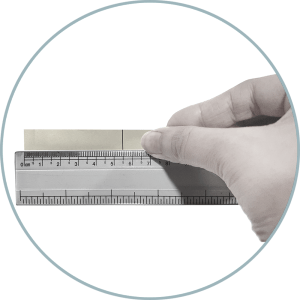
Step 5
Use a ruler to measure the length of the tape/paper strip/string.
Check your ring size measurement with the international ring size chart below, to determine your ring size, by comparing your measurement to the standard ring sizes.
Some reputable jeweler’s rings are specified in standard US sizes. View the conversion chart below to see how US sizes map to finger circumference, as well as how US sizes convert to Canada, Australia, Mexico, New Zealand, UK, Ireland, South Africa, France, Germany, Russia, Japan, India, China, Singapore, South America, Turkey, Italy, Spain, Netherlands & Switzerland ring sizes.
If your size seems to sit between two sizes displayed then you’ll go with the higher of the two sizes:
Seek Professional Help
Visit a Jeweler
When seeking the utmost precision in determining your ring size, there’s no substitute for the expertise of a local jeweler. These skilled professionals possess specialized tools designed to provide you with the most accurate measurement possible.
By entrusting the task to a jeweler, you not only ensure the right size for your ring but also gain access to valuable insights and advice tailored to your specific needs.
They can guide you in choosing the perfect size, taking into consideration different types of rings, such as engagement rings, wedding bands, or statement pieces. A jeweler’s experience is an invaluable resource, particularly when it comes to making well-informed decisions about the jewelry you’ll cherish for a lifetime.
So, for a truly personalized and precise ring sizing experience, don’t hesitate to visit your local jeweler who can offer expertise and guidance beyond measure.
Measure Ring Size With an Existing Ring
What You Need
- The ring size chart below that is printed correctly at 100% full size.
- A ring that fits the finger you want to know the size of.
Printing The Ring Size Chart Correctly
If you haven’t received the ring size chart already printed, then you need to be sure to print it correctly for your measurement to be accurate. Here’s how you do it:
- Before printing ensure that page scaling is set to ‘none’ or print size is set to 100% in your print settings.
- After printing use a ruler to measure the bold 2″ (inch) line at the top of the page to check that is indeed 2 inches which will tell you that the printed size is correct.
Measuring Your Ring
- At the bottom of the printed page is a size chart of men’s and women’s ring sizes 4 to 15.
- Line up the inside of your ring with the outer side of the circles on the page until you find a close match.
- The correct size circle should appear right against the inside edge of the ring: it’s generally better to be slightly too large than slightly too small, but the closest possible match is best.
- The sizes shown on the page are numerical (USA, Canada, etc). Remember that men’s and women’s ring sizes are all the same.
- The measurements shown within each circle below are the inside diameter. The international ring size chart above will show you the circumference size and size in inches if needed.
Note: That only half US numerical ring size increases are shown in the chart. If your ring is mid-way between sizes, then check the ring size chart on the international ring size above to determine a more accurate size for your ring.
The Importance of a Ring Size Chart
Using a Ring Size Chart
A ring size chart serves as an indispensable compass on your journey to discover the ideal fit for your rings. It plays a pivotal role in demystifying the intricate world of ring sizes by offering a clear and visual representation of these sizes. This tool simplifies the process, allowing you to pinpoint your size with confidence and precision.
When seeking your perfect fit, referring to a trustworthy ring size chart becomes paramount. It acts as your safeguard against potential sizing errors that could lead to discomfort or disappointment. By placing your trust in a reliable chart, you ensure that the ring you choose not only complements your style but also graces your finger with the comfort and elegance it deserves.
So, whether you’re shopping for a special occasion or adding a new gem to your collection, let a reputable ring size chart, like ours shown above, be your guiding star in the quest for the perfect ring.
Use a Ring Sizer
This method offers the highest level of precision when determining your ring size. For a convenient and accurate way to find your ring size, we recommend reaching out to us to request any of the ring sizers listed below. We will send you a ring sizer upon request.
Ring-sizing tools fall into two categories: Type 1: finger size measuring tool or a Type 2: keyring measuring tool lined with a gradient of ring sizes:
Type 1:
The figure size measuring tool type ring sizer can simply be looped around your finger and tightened or loosened with the belt.
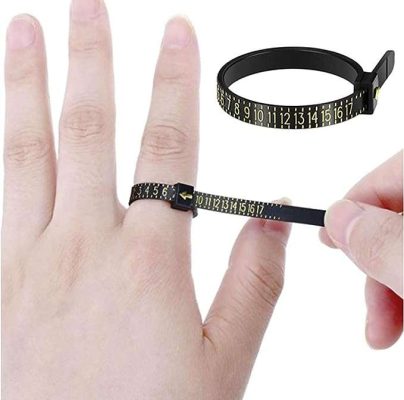
Finger Size Measuring Tool
Type 2:
The keyring measuring tool type ring sizer has metal loops for each ring size, so just try them on your finger until you find the right fit.
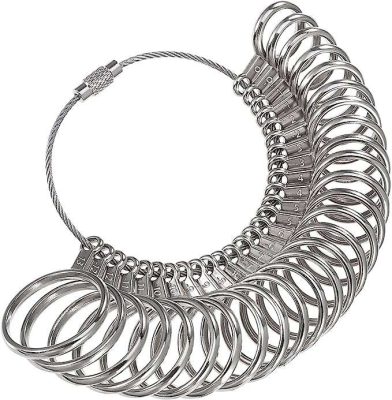
Keyring Measuring Tool
Ring sizers are also valuable tools to have when shopping for rings for family members, ensuring the perfect fit for everyone.
Ring Size Guide
In the United States, ring sizes are represented by numbers and half numbers, typically ranging from 3 to 13.5 for adults. These numerical values correspond to the width of your finger in millimeters. For example, a size 3 ring is designed for a finger with a 14mm width, and the sizes increment by 0.4 millimeters for each half-size. As an illustration, a size 3.5 ring equates to 14.4 mm, while a size 4 measures 14.8 mm.
Women’s rings often range from sizes 3 (14 mm) to 9 (19 mm), while men’s rings typically fall between 8 (18.2 mm) and 14 (23 mm). On average, women commonly wear sizes 5 to 7, and men often wear sizes 10 to 11. However, it’s advisable to obtain an accurate ring measurement before making a significant purchase, especially considering the investment involved in items like engagement rings.
Tips for Ensuring an Accurate Measurement
Choose the Right Time for Measurement
As mentioned earlier, it’s best to measure your finger in the afternoon or evening when your fingers are at their largest due to natural swelling. This timing factor is essential to ensure the most accurate ring size measurement.
Throughout the day, our bodies experience various changes, and our fingers are no exception. In the morning, they tend to be at their slimmest due to reduced fluid retention and lower overall body temperature.
However, as the day progresses, activities, warmth, and even food intake can cause our fingers to slightly swell. By measuring your finger during the afternoon or evening, you account for these natural fluctuations, resulting in a more precise and comfortable ring fit that will feel just right no matter the time of day.
Consider the Weather and Temperature
Factor in temperature changes, as they can affect your finger size significantly. Temperature plays a significant role in how our bodies retain fluids and, consequently, our finger size. In colder conditions, blood vessels constrict, causing fingers to shrink slightly, while in warmer weather, vessels dilate, leading to finger expansion.
If you live in an area with extreme temperature variations, it’s advisable to measure your finger at different times to ensure a consistent size. This precaution becomes particularly important if you plan to wear the ring year-round, as you want it to fit comfortably in both the coldest winter months and the hottest summer days.
By considering the impact of temperature on your finger size, you’ll be better equipped to select a ring size that provides optimal comfort and wearability throughout the year.
Measure the Appropriate Finger
Ensure you are measuring the finger on which you intend to wear the ring, as this can significantly impact the accuracy of your ring size. It’s worth noting that fingers on your dominant hand may be slightly larger than those on your non-dominant hand.
This difference arises from the fact that the muscles and tendons in your dominant hand are more developed and, consequently, can result in a slightly larger finger size.
Therefore, if you plan to wear the ring on your non-dominant hand, it’s crucial to measure that specific finger to guarantee a snug and comfortable fit. This attention to detail ensures that the ring will feel comfortable and secure, enhancing your overall wearing experience and preventing any potential discomfort or inconvenience down the line.
Repeat Measurements for Accuracy
For added confidence in determining your ring size, it’s advisable to measure your finger multiple times using different methods. This redundancy in measurements can significantly increase the accuracy of your sizing.
By cross-referencing the results obtained from various techniques, you can confirm the consistency of the measurements. When these multiple measurements yield similar results, you can be more confident that you’ve achieved an accurate measurement.
This approach minimizes the chances of errors or discrepancies and ensures that the chosen ring size will provide the perfect fit, ensuring your comfort and satisfaction when wearing your ring. Ultimately, investing a bit of extra time and effort in this process pays off in the form of a well-fitted and comfortable piece of jewelry that you’ll cherish for years to come.
Selecting the Perfect Engagement or Wedding Ring Size
Surprise Proposals vs. Sizing Together
If you’re planning a surprise proposal, determining your partner’s ring size can be a thrilling yet secretive endeavor. One effective method is to discreetly borrow one of their existing rings, preferably one worn on the intended ring finger, and take it to a jeweler for sizing.
Alternatively, you can seek assistance from a close friend or family member who might have access to this information. However, if you and your partner are sizing the ring together, it’s highly recommended to visit a jeweler. This ensures that the ring size is a precise match, eliminating any guesswork and guaranteeing the perfect fit for this meaningful and sentimental piece of jewelry.
Planning ahead and considering your partner’s preferences will result in a proposal that is both memorable and tailored to their individual style.
Resizing Options
In the event that the ring doesn’t fit perfectly, it’s reassuring to know that most jewelers offer resizing services. This valuable service ensures that your ring can be adjusted to achieve the ideal fit. However, it’s essential to be aware that resizing may not be feasible for all ring styles. Intricately designed or gemstone-laden rings, for instance, may pose challenges when it comes to resizing.
Therefore, it’s wise to discuss potential resizing options with your jeweler before making a purchase. This proactive approach allows you to make an informed decision, ensuring that the ring you choose can be customized to your precise specifications, or you can explore alternative designs that offer more flexibility in terms of resizing.
Ultimately, it’s all about finding the perfect ring that not only symbolizes your love but also fits flawlessly on your or your loved one’s finger.
Sizing for Different Types of Rings
Engagement Rings
Engagement rings are traditionally worn on the left ring finger, symbolizing love and commitment. Getting the size right is essential, especially for intricate or gemstone-laden styles, as resizing such rings can be challenging. To ensure your engagement ring fits perfectly and maintains its structural integrity and design, accurate sizing from the start is crucial.
Wedding Bands
Wedding bands are often worn with engagement rings, and their comfortable fit is essential. When sizing your wedding band, consider its width, as wider bands may require a slightly larger size to sit comfortably alongside the engagement ring, ensuring a harmonious and elegant pairing that symbolizes your lifelong commitment.
Fashion Rings
Fashion rings offer endless design possibilities, suitable for any finger. While resizing is an option for many, starting with an accurate size ensures the best fit, comfort, and aesthetics, making your fashion ring a stylish accessory for any occasion.
Taking Care of Your Ring
Maintaining the Fit
Over time, factors like weight changes and temperature fluctuations can affect your ring’s fit. Regularly assess the fit and resize the ring as needed to ensure continued comfort and a secure fit.
Resizing Your Ring When Necessary
If your ring becomes too tight or too loose, consult a reputable jeweler in your country for resizing options. They can typically make adjustments to ensure a comfortable fit.
Adjusting for Seasonal Changes
Consider seasonal changes in your ring’s fit, as temperature fluctuations can cause fingers to swell or shrink. Be prepared to adjust your ring size accordingly, ensuring comfort throughout the year.
How to Measure Bracelet and Bangle Size
Bracelet Size
Bracelet and bangle size is a crucial consideration when it comes to accessorizing with these wrist adornments. Finding the perfect fit ensures both comfort and style. For bracelets, measuring your wrist circumference accurately helps in selecting the appropriate size, whether you prefer a snug fit or a looser drape.
Here are the steps that will help you determine your bracelet size. To measure your hand, gather a piece of paper, tape, or string, along with a ruler:
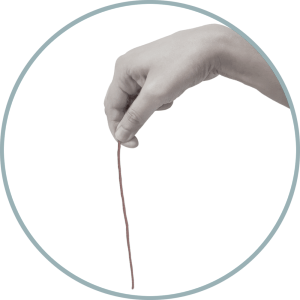
Step 1
Trim a piece of string to a length that easily encircles your hand.
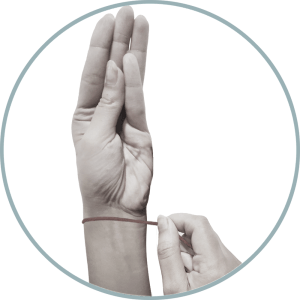
Step 2
Use the string to measure your wrist, tighten the meeting portion of both ends of the string to a fit most convenient for you.
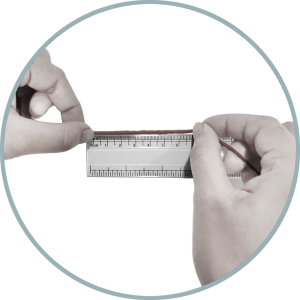
Step 3
Use a ruler to measure the length of the string.
Now select the size from the options given in the bracelet size chart below. If your bracelet size is in between the options shown below, select the one that is closest to yours:
Bangle Size
Bangles, on the other hand, come in various sizes, and choosing the right one is essential to ensure they slip on comfortably over your hand while still fitting snugly around your wrist. The right bracelet or bangle size can elevate your overall look, adding a touch of elegance or a pop of color to your ensemble, making it essential to choose wisely.
Here are the steps that will help you determine your bangle size. To measure your hand, gather a piece of paper, tape, or string, along with a ruler:
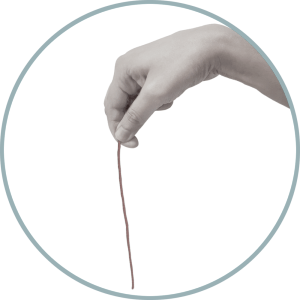
Step 1
Trim a piece of string to a length that easily encircles your hand.
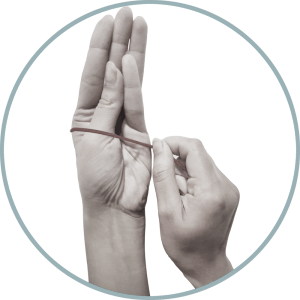
Step 2
Touch your thumb to your little finger and measure the widest portion of your hand with the string and mark the meeting point.
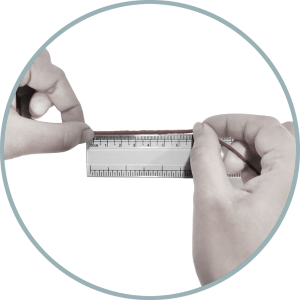
Step 3
Use a ruler to measure the length of the string.
Check your measurement with the bangle size chart below to determine your bangle size.
Bangles are sized according to their diameter, measured in inches. Each inch is divided into 16 sections. For example, a bangle size of 2-8 means it has a diameter of 2 inches plus 8/16 of an inch, which is equivalent to 2.5 inches.
Use a Bracelet and Bangle Sizer
This method offers the highest level of precision when determining your bracelet and bangle size. For a simple and precise method of determining your bracelet and bangle size, we encourage you to contact us if you wish to request the bracelet and bangle sizer listed below. We will send you a bracelet and bangle sizer upon request.
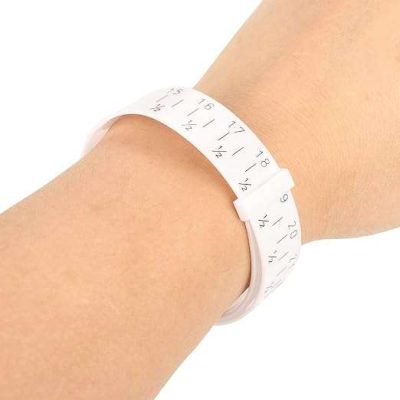
Bracelet & Bangle Measuring Tool
The bracelet & bangle is a valuable tool to have when shopping for a bracelet or bangle for family members, ensuring the perfect fit for everyone.
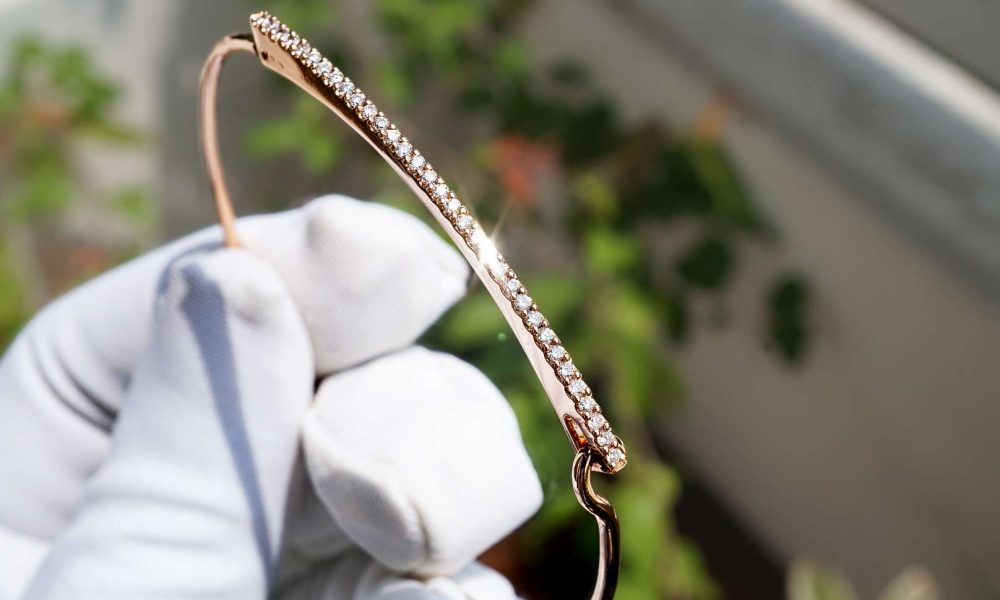
A Diamond Bracelet
Final Thoughts
Finding the perfect ring size is a crucial step in the ring-buying process, ensuring comfort, safety, and aesthetics. Whether you choose to have your finger professionally measured or use DIY methods at home, following the tips and guidelines in this comprehensive guide will help you achieve an accurate and comfortable fit.
Remember that resizing options are available if your ring size changes over time, so your cherished rings can continue to adorn your fingers with style and grace.
FAQs About Ring Size and Bracelets & Bangles
The average ring size for women in the United States is around 6 to 6.5.
The average ring size for men in the United States falls between 9 and 10.
You can measure your ring size at home using a strip of paper or a printable ring sizing guide. Wrap it around your finger and mark where it overlaps, then measure the length in millimeters and refer to a size chart for conversion.
While many rings can be resized, some intricate or gemstone-laden designs may be challenging to resize without compromising the ring's integrity. Consult a jeweler for guidance.
It's a good idea to have your ring's fit checked annually or whenever you notice significant changes in your finger size due to factors like weight fluctuations or temperature changes.
In most cases, rings can be resized multiple times, but there may be limitations depending on the ring's design and material. Consult a jeweler for advice.
The US uses a numerical system, while Europe uses the inner circumference of the ring in millimeters. An international ring sizing conversion chart can help you find the corresponding size.
To choose the right bracelet size, measure your wrist circumference and add a small amount for comfort. Standard women's bracelets typically measure around 7 inches, while men's bracelets are usually around 8 inches.
A bracelet is a flexible band that can be opened and closed to fit around the wrist. In contrast, a bangle is a rigid, circular piece that is slipped over the hand onto the wrist.
Yes, you can create stylish stacks by wearing multiple bracelets and bangles together. Mixing different styles and materials can add depth and personality to your wrist accessories.

